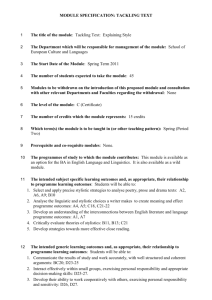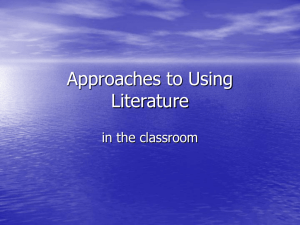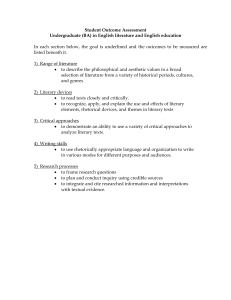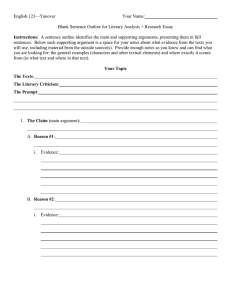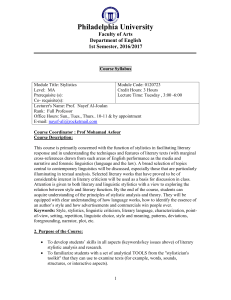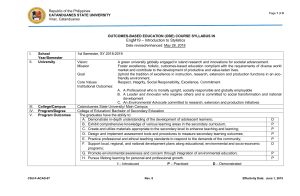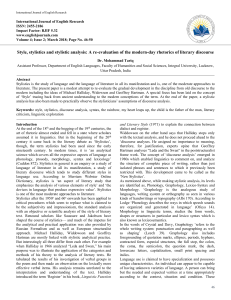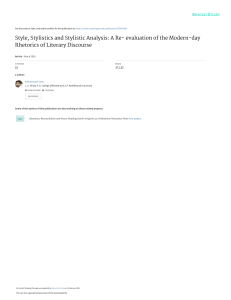Philadelphia University
advertisement
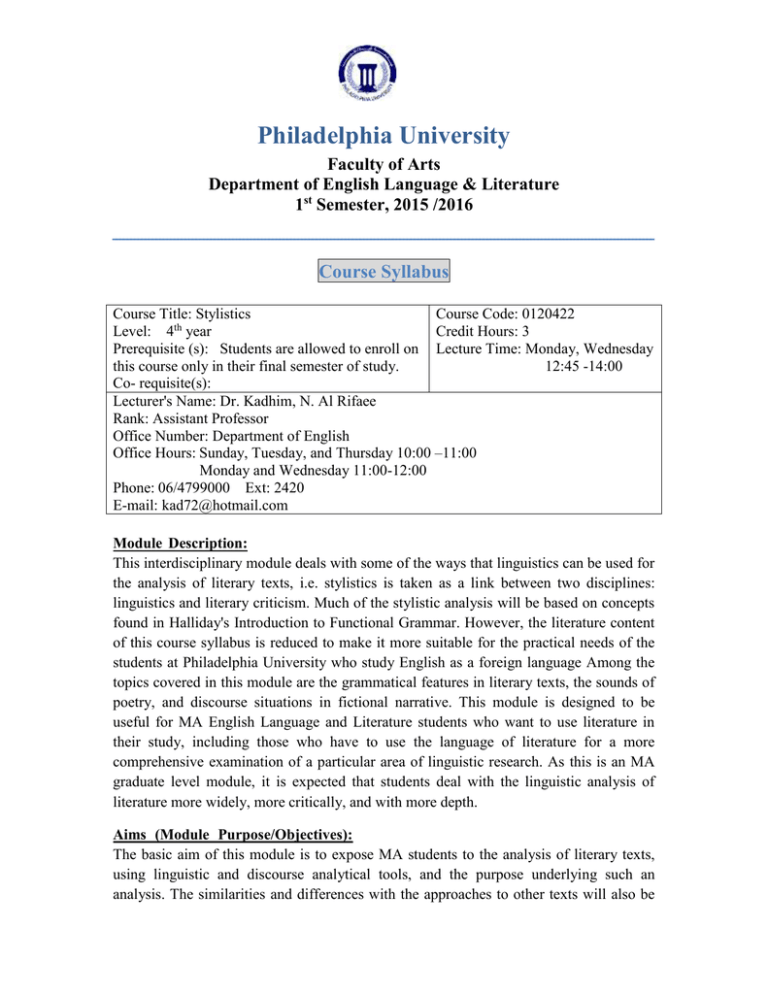
Philadelphia University Faculty of Arts Department of English Language & Literature 1st Semester, 2015 /2016 ـــــــــــــــــــــــــــــــــــــــــــــــــــــــــــــــــــــــــــــــــــــــــــــــــــــــــــــــــــــــــــــــــــــــــــــــــــــ Course Syllabus Course Title: Stylistics Course Code: 0120422 th Level: 4 year Credit Hours: 3 Prerequisite (s): Students are allowed to enroll on Lecture Time: Monday, Wednesday this course only in their final semester of study. 12:45 -14:00 Co- requisite(s): Lecturer's Name: Dr. Kadhim, N. Al Rifaee Rank: Assistant Professor Office Number: Department of English Office Hours: Sunday, Tuesday, and Thursday 10:00 –11:00 Monday and Wednesday 11:00-12:00 Phone: 06/4799000 Ext: 2420 E-mail: kad72@hotmail.com Module Description: This interdisciplinary module deals with some of the ways that linguistics can be used for the analysis of literary texts, i.e. stylistics is taken as a link between two disciplines: linguistics and literary criticism. Much of the stylistic analysis will be based on concepts found in Halliday's Introduction to Functional Grammar. However, the literature content of this course syllabus is reduced to make it more suitable for the practical needs of the students at Philadelphia University who study English as a foreign language Among the topics covered in this module are the grammatical features in literary texts, the sounds of poetry, and discourse situations in fictional narrative. This module is designed to be useful for MA English Language and Literature students who want to use literature in their study, including those who have to use the language of literature for a more comprehensive examination of a particular area of linguistic research. As this is an MA graduate level module, it is expected that students deal with the linguistic analysis of literature more widely, more critically, and with more depth. Aims (Module Purpose/Objectives): The basic aim of this module is to expose MA students to the analysis of literary texts, using linguistic and discourse analytical tools, and the purpose underlying such an analysis. The similarities and differences with the approaches to other texts will also be discussed. Students should also arrive at a more mature understanding of how an interpretive and qualitative approach to language can enhance their thinking not only about the language of literature, but about language in general. Moreover, the attention to language involved in stylistic analysis makes this module particularly appropriate for the needs of MA students of English as nonnative speakers of the language. Furthermore, although stylistics entails linguistic analysis, it also develops the learner’s literary competence. The students of this course would be far better readers with a more active and independent approach to literary texts. They would also be better speakers and writers of English. Teaching Methods: (Lectures, Discussion Groups, Tutorials, Problem Solving, Debates…etc) Although the teaching is lecture-based, the lecture sessions are interactive, and students are expected to respond accordingly. The first hour of the three-hour sessions will involve discussions among students on the topic dealt in the previous week. Course/ Module Components: For the detailed explanation of the main grammatical model used for this module, students may refer to the following book: Halliday, M. A. K. An Introduction to Functional Grammar. Second Edition. London: Arnold, 1994. Intended Learning Outcomes:(Knowledge and Understanding, Cognitive Skills, Communication Skills, Transferable skills). a. Knowledge & Understanding: Students are enabled to understand how an interpretive and qualitative approach to language can enhance their thinking not only about the language of literature, but about language in general. b. Cognitive Skills (Thinking & Analysis): Students' literary competence is developed. The students of this course would be in a position to approach, comprehend, and analyze literary texts independently. c. Communicative Skills (Personal and Academic) Students would be better speakers and writers of English as a foreign language. d. Practical and Subject Specific Skills (Transferable Skills) Students will be able to utilize the analytical techniques used in this module to enhance the process of learning English and also to apply new methods in their teaching of English literature. Assessment Instruments Modes of Assessment Score Mid- term Exam Research paper Presentations Final Exam Total 30% 20% 10% 40% 100 Date Week 8 Week 14 Week 15 Week 16 Course / Module Academic Calendar: Week Date (1) October 1822, 2015 1. Introduction: October 2529, 2015 2. (2) (3) (4) (5) (6) (7) (8) Nov. 1-5, 2015 Basic & Support Material to be covered Preliminary Considerations Linguistics, Style, & Stylistics Overload Works A paper on What Linguistics is Lexical Categories: 'Nouns' and 'Verbs' in Stylistic Analysis . 3. Lexical Categories: 'Adjectives' & 'Adverbs' in Stylistic Analysis Nov. 15-19, 4. Lexical Categories: 'Clause Structure' in Stylistic 2015 Nov. 22-26, 5. 'Sounds' in the analysis of Poetry 2015 Nov. 29-Dec. 3 , 2015 First Exam Dec. 6-10, 2015 A paper on What Poetic Devices 6. Mood & Modality Dec. 13-17, 7. Transitivity 2015 A paper on Transitivity (9) Dec. 20-24, 8. Point of View in Narratives 2015 (10) Dec. 27-31, 9. Complex Clauses in Literary Texts 2015 (11) (12) Jan. 3-7, 2016 Jan. 10-14, 2016 10. Theme-Rheme Second Exam (13) Jan. 17-21, 2016 11. Analysis of Cohesion in Literary Texts (14) Jan. 24-28, 2016 12. Principles of Style Literary Evaluation (15) A paper on Cohesion & Coherence A paper on Stylistics General Revision Course / Module Academic Calendar: Expected Workload: On average students are expected to spend at least (2) hours of study for each 50- lecture/ tutorial. Attendance Policy: Absence from lectures and /or tutorials shall not exceed 15%. Students who exceed the 15% limit without a medical or emergency excuse acceptable to and approved by the Dean of the relevant college /faculty shall not be allowed to take the final examination and shall receive a mark of zero for the course. If the excuse is approved by the Dean, the student shall be considered to have withdrawn from the course. Module/ Course Policies: 1. You are allowed up to (5) absences on Mondays/Wednesdays or (7) absences on Sundays/Tuesdays/Thursdays. If you exceed this number, you will fail the course. 2. Tardiness will not be tolerated. If you come to class after I take attendance, you are welcome to attend, but you will be considered absent. 3. Plagiarism is a serious academic offense that will result in your failing the course. 4. Learning notes by heart and repeating the information word by word in the exam is a type of plagiarism. 5. Participation is and essential part of course work. It does not merely mean coming to class; it involves preparing before hand and playing an active role in class discussion. 6. Make-up exams will be offered for valid reasons only with the consent of the Dean. Text Book(s): The course draws heavily from Ismail Abu Talib's WWW Course "Literary Stylistics". References: Carter, Ronald (ed.). Language and Literature. London: Unwin, 1982. Hasan, Ruqaiya. Linguistics, Language and Verbal Art. Deakin UP, 1985. Leech, Geoffrey N. A Linguistic Guide to English Poetry. London: Longman, 1969. — & M. H. Short. Style in Fiction. London: Longman, 1981. Short, Mick Exploring the Language of Poems, Plays, and Prose. Harlow, Essex: Longman , 1996. — (ed.). Reading, Analysing, and Teaching Literature. London: Longman, 1988. Talib, Ismail S. The Language of Postcolonial Literatures. London: Routledge, 2002. Toolan, Michael. Language in Literature: An Introduction to Stylistics. London: Arnold, 1998. Wales, Katie. Dictionary of Stylistics. London: Longman, 1989.
